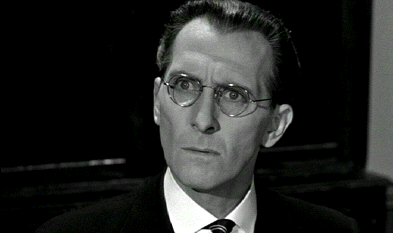Director: Quentin Lawrence
Writers: David T. Chantler, Lewis Griefer, adapted from Jacques Gillies’ teleplay The Gold Inside
Producers: Michael Carreras, Anthony Nelson-Keys
Cast: Peter Cushing, André Morell, Richard Vernon, Norman Bird, Kevin Stoney, Barry Lowe, Lois Daine, Edith Sharpe, Alan Haywood, (and uncredited cast members) Charles Morgan, Jimmy Cains, Vera Cook, Paddy Smith, Fred Stone, Gareth Tandy, Graham Tonbridge
Harry Fordyce (Peter Cushing) is the fastidious, unsentimental manager of the Haversham, England branch of the City & Colonial Bank. As the bank opens on December 23rd, Colonel Gore Hepburn (André Morell) arrives from the bank’s insurance company to inspect security. Once alone with Fordyce, Hepburn reveals that he is actually there to coerce Fordyce into helping him rob the bank or Hepburn’s accomplices will kill Fordyce’s wife and son.
The Flashback Fanatic movie review
Cash on Demand is not a true modern remake of Dickens’ story, but it certainly shares the same sentiments while exchanging the supernatural for a criminal threat. Harry Fordyce is another office tyrant that receives his dose of holiday terror not from spectral visitations but from a cunning fiend that threatens everything he holds dear. Fordyce’s cold and efficient facade is cracked by the danger to his wife and child that forces him to assist Hepburn in the bank robbery.
The film opens with a leisurely series of panning shots throughout the empty interior of the bank just before it opens for the day’s business. This unusual and uneventful introduction manages to raise our anticipation. We are made to pay attention to the mundane setting that normally would just be a place where business is conducted attracting no interest at all. The uneasy music score that accompanies this while the credits are shown is far more effective than a rapid-fire series of quick cuts and CGI graphics meant to pass the time until the action begins, which is how so many films must present non-plot moments beginning a film these days. We are given time to get a feel for the environment where this entire story will occur.
There is nothing exotic to see in this bank branch setting. However, it’s reality and our intimacy with it is vital to increasing our sense of immediacy about the situation, the characters, and the stakes involved. One hardly expects anything other than the sedate business of a small town bank to occur here. That makes the contrast of the sudden introduction of the sinister all the more riveting. The fact that most of the film takes place in real time during the first hour that the bank opens for business further stresses the immediacy of everything that happens.
One could refer to all of the above business about this film’s stage setting as a less-is-more approach. That is certainly not the case when it comes to the performances of the two leads. Peter Cushing and André Morell are terrific. Cushing and Morell had starred opposite each other two years earlier as Sherlock Holmes and Dr. Watson, respectively, in Hammer Films’ The Hound of the Baskervilles (1959). The dynamic between these two actors is much different this time around.
Peter Cushing, of course, was a mainstay of Hammer’s many Gothic horror films by this time. Here he is neither villain nor hero. As bank branch manager Harry Fordyce, he is the Ebenezer Scrooge stand-in that first earns our amused contempt and then becomes pathetic and sympathetic as the unwilling accomplice in a criminal’s cruel robbery plot.
André Morell is a sinister joy to watch as Colonel Gore Hepburn. He dispenses amiable charm and wit while reveling in the power he wields over the stuffy Fordyce. He takes sadistic satisfaction in making Fordyce squirm. Hepburn not only makes Fordyce aid him in the robbery of the bank Fordyce takes so much professional pride in, he also tweaks Fordyce’s coldness and lack of Christmas spirit. Hepburn is a fiend, yet he does have more social graces than his bullied victim.
Hammer Films' bread-and-butter was not only their Gothic horror films, but also their adaptations of radio and television productions. A 1960 teleplay, The Gold Inside, was the basis for this film. That production also starred André Morell with Richard Vernon also in the role of the head bank clerk Pearson. The teleplay’s director, Quentin Lawrence, is carried over here, too. He had helmed another of my all-time favorite British thrillers that he also originated on television: the sci-fi horror flick The Trollenberg Terror (1958), re-titled The Crawling Eye in the US.
So, if you have enough neckties, socks, and ugly sweaters, ask for some Cash on Demand this Christmas. Just remember that this much suspense won’t fit in a money holder card. It will take at least four suitcases.














No comments:
Post a Comment